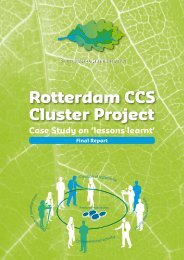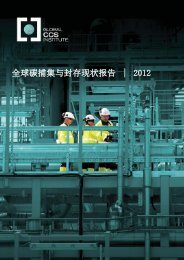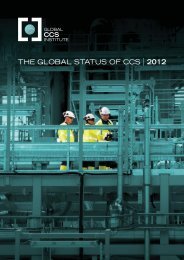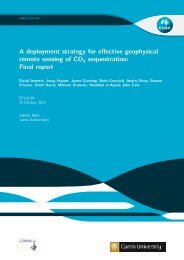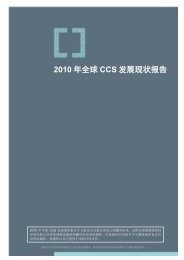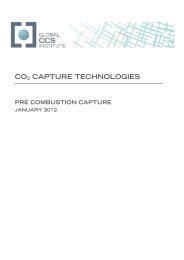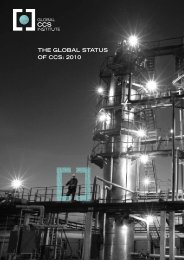Perceptions of CO2 Report - Global CCS Institute
Perceptions of CO2 Report - Global CCS Institute
Perceptions of CO2 Report - Global CCS Institute
- No tags were found...
You also want an ePaper? Increase the reach of your titles
YUMPU automatically turns print PDFs into web optimized ePapers that Google loves.
2.3 <strong>Perceptions</strong> <strong>of</strong> <strong>CCS</strong><strong>CCS</strong> has the potential to reduce GHG emissions and stem anthropogenic climate change throughthe mitigation <strong>of</strong> large amounts <strong>of</strong> CO 2 (Ashworth, Boughen, Mayhew, & Millar, 2009a; Ashworth,et al., 2009b). While media coverage <strong>of</strong> <strong>CCS</strong> has generally increased and become more positive(Hansson & Bryngelsson, 2009), studies from Australia (Ashworth, et al., 2009a), Canada (Sharp,et al., 2009), France (Ha-Duong, Nadaï, & Campos, 2009), Germany (Fischedick, et al., 2009),Japan (Itaoka, et al., 2009; Itaoka, Saito, & Akai, 2005), the Netherlands (de Best-Waldhober, etal., 2009; de Coninck & Huijts, 2005), the UK (Reiner, et al., 2006a), the US (Curry, et al., 2005;Palmgren, et al., 2005; Reiner, et al., 2006b), and Sweden (Reiner, et al., 2006a) all indicate thatthe general public in these countries has low levels <strong>of</strong> knowledge about both <strong>CCS</strong> as a technology(particularly compared with other emission reducing technologies such as wind and solar power –see e.g. Duan, 2010) and the environmental concerns it addresses.Despite the public’s unfamiliarity with <strong>CCS</strong> as a GHG mitigation technology, a vast body <strong>of</strong>literature exists that explores how it is perceived by the public. <strong>CCS</strong> is <strong>of</strong>ten perceived negativelyas dangerous and risky in several ways, such as: safety; potential for contamination <strong>of</strong> anddamage to the natural environment (i.e. ground water, plants, animals etc.) owing to potentialleakage at storage sites; cost; potential to hinder development <strong>of</strong> renewable energy technologies;and lack <strong>of</strong> effective contribution to addressing future climate change needs and energyrequirement solutions (Ashworth, et al., 2009a; de Best-Waldhober, et al., 2011; Oltra, Sala, Solà,Di Masso, & Rowe, 2010). These perceived risks have, in some instances, led to the rejection <strong>of</strong><strong>CCS</strong> as a mitigation strategy by the general public (Oltra, et al., 2010).Lack <strong>of</strong> knowledge about <strong>CCS</strong> technology and its potential benefits is <strong>of</strong>ten cited as a key reasonfor these negative public perceptions. Several researchers (Duan, 2010; Itaoka, et al., 2005) havesuggested that increased support could be garnered for the technology if the public were more fullyinformed about <strong>CCS</strong>’s potential effectiveness as a GHG mitigation option. Results from Itaoka andcolleagues (2009) results support this claim, suggesting that people who claim to have moreknowledge about <strong>CCS</strong>’s effectiveness as a climate change mitigation option perceive it morefavorably.Research into <strong>CCS</strong> perceptions has provided valuable insight into the social factors that influencethese perceptions as well as its acceptability as a viable mitigation option. A study conducted byBradbury and colleagues (2009) demonstrated that participant concerns regarding fairness andtrust were key determinants <strong>of</strong> perceptions <strong>of</strong> <strong>CCS</strong> technology in the communities and regionsstudied. Trust held in sources <strong>of</strong> information about <strong>CCS</strong> technology has also been found by othersto influence perceptions (Terwel, Harinck, Ellemers, Daamen, & de Best-Waldhober, 2009;Tokushige, Akimoto, & Tomoda, 2007), as have various other factors:• understanding <strong>of</strong> <strong>CCS</strong>’s potential benefits and effectiveness (Itaoka, et al., 2005; Terwel, etal., 2009; Tokushige, et al., 2007; Ashworth, et al., 2011b);• concerns over safety and leakage risks (Itaoka, et al., 2005; Ashworth, et al., 2011b);• beliefs about who is responsible for CO 2 mitigation action (Itaoka, et al., 2005; Ashworth, etal., 2011b);• beliefs that employing <strong>CCS</strong> technology will be detrimental to the development <strong>of</strong> futurerenewable energy technologies (Itaoka, et al., 2005; Ashworth, et al., 2011b);Understanding how individuals perceive carbon dioxide | 5




